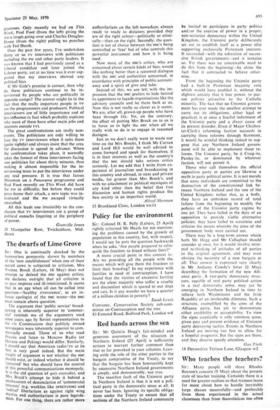Red hands across the sea
Sir: Mr Quintin Hogg's fair-minded and generous assessment of the situation in Northern Ireland (25 April) is sufficiently serious to warrant further comment than that so far provoked in your columns. Leav- ing aside the role of the other parties to the bargain compromise of the Treaty, to say that the bargain has been honourably kept by successive Northern Ireland governments is simply, and demonstrably, not true.
The manifest fault of the Unionist party in Northern Ireland is that it is not a poli- tical party in the democratic sense at all. It never has been. Ignoring its specific obliga- tions under the Treaty to ensure that all sections of the Northern Ireland community
be invited to participate in party politics and/or the exercise of power in a proper, non-sectarian democracy within the United Kingdom, the Unionist party deliberately set out to establish itself as a power elite supporting exclusively Protestant interests. It succeeded—with the toleration of succes- sive British governments—and it remains so. Yet there was no conceivable need to do this from the beginning—let alone the fact that it contracted to behave other- wise.
From the beginning the Unionist party had a built-in Protestant majority vote which would have enabled it, without the slightest anxiety that it lose power, to pur- sue policies attractive to the Catholic minority. The fact that no Unionist govern- ment has ever made the smallest attempt to carry out its obligations, either legal or practical, is at once a fearful indictment of the Unionist party and a direct cause of its present disorder. Even if Major °tithes- ter-Clark's reforming faction succeeds in tarrying those reforms through Stormont, it would be wishful thinking indeed to sup- pose that any Northern Ireland govern- ment will be able to implement those re- forms. The Unionist party, be it Craig-ite, Paisley-ite, or dominated by whatever faction, will not permit it.
Those who call themselves the official opposition party or parties are likewise a myth in party political terms. It is not merely that some individuals are committed to the destruction of the constitutional link be- tween Northern Ireland and the rest of the United Kingdom; rather that, as a body, they have an unbroken record of total failure from the beginning to modify the policies of the Unionist party regime by one jot. They have failed in the duty of an opposition to provide viable alternative policies; they have failed to scrutinise and criticise the means whereby the aims of the government body were carried out.
There may be a long-term answer which both Mr Hogg and Mr Callaghan should consider at once, for it would involve mini- mal re-thinking of attitudes of all parties to the original agreement, and may even obviate the necessity of a new bargain at all. That answer is expressed very clearly in Mr Anthony Cowdy's letter (2 May) describing the formation of the new Alli- ance party. A two-party democratic struc- ture, capable of real party political action in a real democratic sense, may yet be emerging in Northern Ireland in time to relieve both Westminster and the Irish Republic of an intolerable dilemma. Such a structure, exemplified by the aims of the Alliance party, has yet to demonstrate either credibility or acceptability. To view the signs sceptically is only common sense, given past and present evidence of Unionist party destroying tactics. Events in Northern Ireland are moving too fast to allow for a hopeful prognosis. But the signs are there, and they deserve speedy attention.


































 Previous page
Previous page